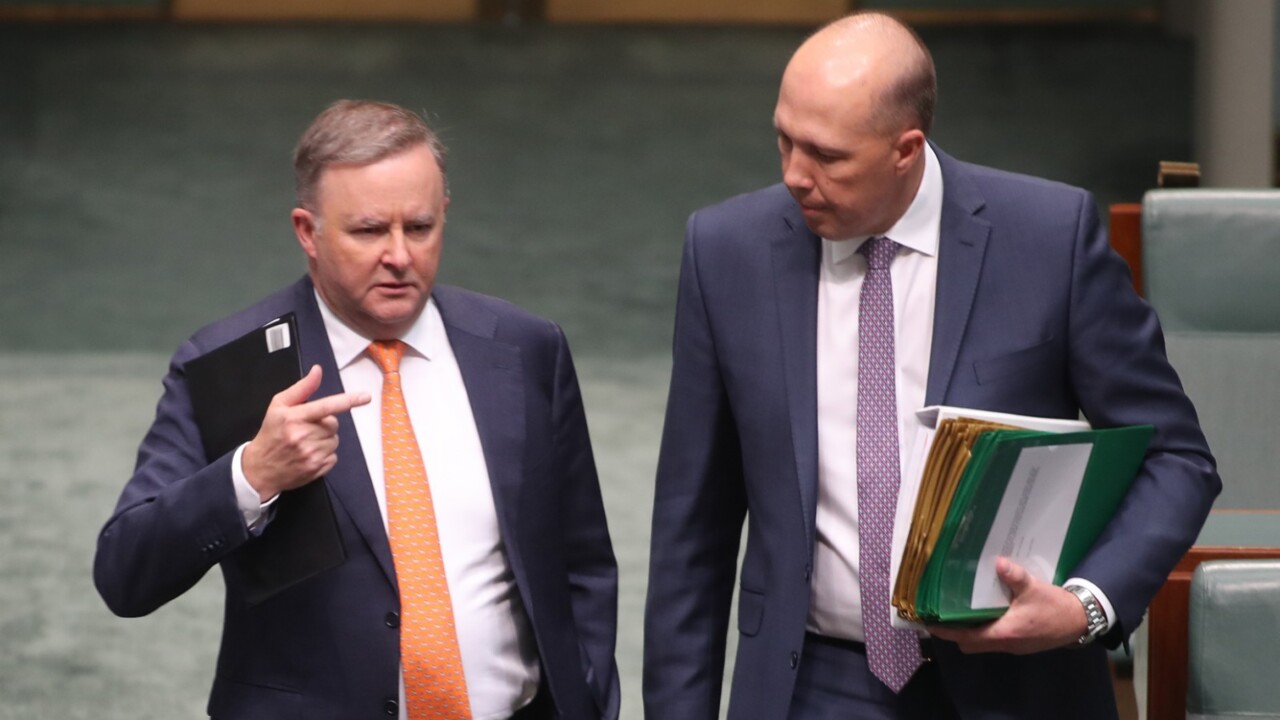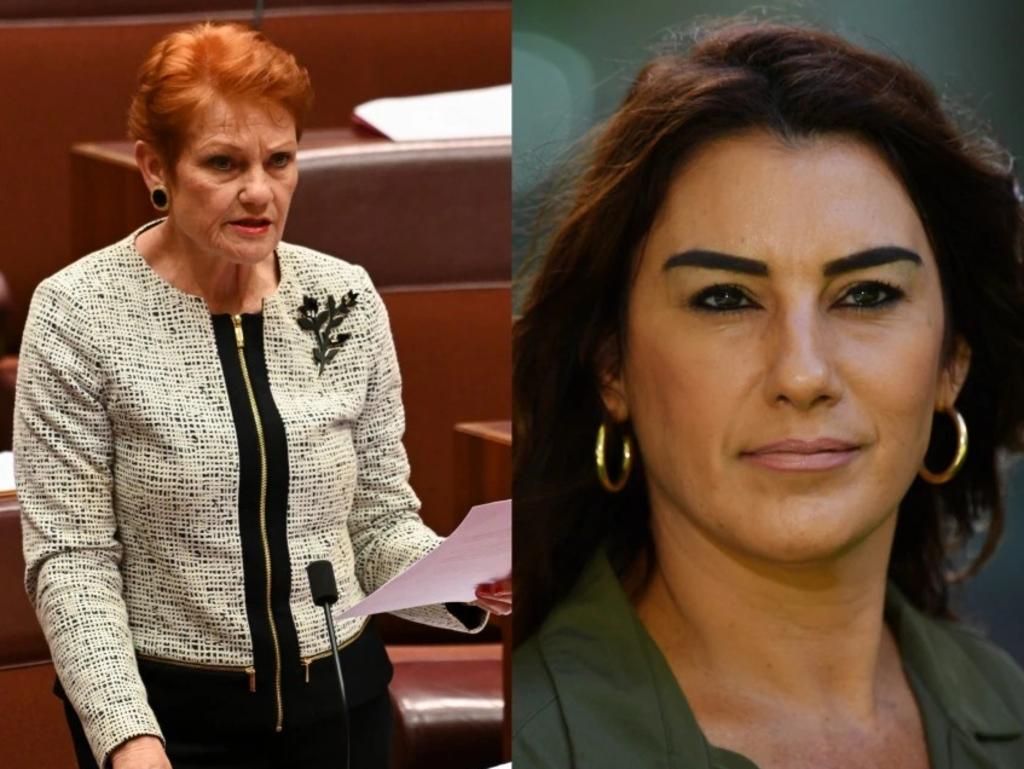Anthony Albanese faces multiple legislative roadblocks in Senate
Anthony Albanese is facing multiple legislative roadblocks in the Senate, as the Coalition and Greens hold talks over ‘red lines’ that threaten to scuttle Labor’s agenda.

Anthony Albanese is facing multiple legislative roadblocks in the Senate, as the Coalition and Greens hold talks over “red lines” that threaten to scuttle Labor’s key manufacturing, climate change and industrial relations policy agenda.
The Coalition, Greens and crossbenchers were expected to inflict the first major parliamentary defeat for the Prime Minister in the Senate on Thursday, joining forces to block government regulations overriding requirements that super funds publicly disclose donations and payments.
The Australian understands the Greens are open to joining the Coalition in torpedoing other legislation, including the $15bn National Reconstruction Fund and new Safeguard Mechanism rules forcing big polluters to slash emissions faster, if the government rejects their demands to stop new coal and gas projects.
Industry Minister Ed Husic, who is leading talks on the NRF and will meet key crossbenchers next week, on Wednesday attacked the Coalition for failing to “back Australian manufacturing” at a time of unprecedented geo-strategic competition.
After The Australian on Monday revealed Peter Dutton would block the NRF, Greens leader Adam Bandt said: “We’re deeply concerned with the lack of detail contained in this legislation … it could take us backwards on the climate emergency.
“There is an unacceptable level of risk with this legislation that this government, or subsequent governments, have almost unlimited discretion to declare ‘priority areas’ for a gas-fired recovery or a coalmine renaissance,” Mr Bandt said.
“There is a serious possibility that this $15bn fund could be turned into a ministerial vessel for fossil fuel finance.”
The left-wing party, which holds the balance of power in the Senate, is preparing a broader pushback against Mr Albanese’s legislative agenda, including the NRF, Safeguard Mechanism and looming IR changes flagged by the Labor government.

Greens sources said that they were adopting a “more aggressive approach” in the Senate, while Coalition insiders confirmed the parties were discussing their “red lines” on government legislation.
Other minor parties on Wednesday expressed growing frustration with the federal government over negotiations on contentious legislation, including last year’s energy market intervention, which they described as “rushed”.
Senior government figures, who were surprised by the Coalition’s opposition to the NRF and questioned the Greens’ position given the fund isn’t focused on fossil fuels, remain confident they can win crossbench support and have the National Reconstruction Fund Corporation in place by July. The fund, which is modelled on the Clean Energy Finance Corporation, is the government’s lead co-investment vehicle that will provide loans, equity investment and guarantees to boost modern manufacturing.
Priority funding areas under the NRF include renewables and low-emission technologies, medical science, defence capability and targeted value-add investments across the resources, agriculture, forestry and fisheries sectors.
Mr Husic, who earlier this week reached out to Deputy Opposition Leader Sussan Ley to discuss the Coalition’s opposition to the NRF, said most MPs understood the fund would re-energise “manufacturing and reduce our dependence on concentrated supply chains”.
“The Liberals’ and Nationals’ refusal to back the NRF sends the message they don’t care about protecting or growing manufacturing jobs in regional Australia and our outer suburbs. Peter Dutton can try to claim his party is the party of the working class as much as he likes, but manufacturing workers can tell a flake and a fake from a mile off,” Mr Husic told The Australian.

“His refusal to back the NRF is yet another example of him talking a big game on Australian manufacturing but failing to deliver when it’s needed.”
The Jacqui Lambie Network and One Nation, boasting two senators each, along with independent ACT senator David Pocock, who will meet with Mr Husic next week, are yet to land final positions on the NRF.
To pass legislation through the Senate without the Coalition, the Albanese government needs the Greens, which have 11 senators after Lidia Thorpe quit the party, and two crossbench senators.
After Mr Albanese backed down on his threat to not fund Yes and No pamphlets ahead of the referendum to enshrine a constitutional voice to parliament, Mr Dutton said the government’s negotiating power in the Senate had “changed somewhat in the last 24 hours”.
The Opposition Leader said the Safeguard Mechanism, requiring the 215 largest-emitting facilities to slash emissions by almost 5 per cent each year out to 2030, was “three times the tax that Julia Gillard proposed”.
“It’s going to drive up the cost of living, and Australians at the moment are sitting there doing their budgets, not working out how they’re going to pay for everything that they’ve got stacking up on their kitchen table.
“They are really struggling, and they don’t need extra costs and extra budget items and additional expenditure imposed on them by the Labor Party and the Greens – and that’s what this does. It’s inflationary and it’s a tax on businesses that will be met by consumers.”
The Australian understands the Greens could move to strengthen the integrity of carbon credits via legislation but use a disallowance motion to undermine the Safeguard Mechanism and proposed carbon-trading scheme for heavy industry.







To join the conversation, please log in. Don't have an account? Register
Join the conversation, you are commenting as Logout